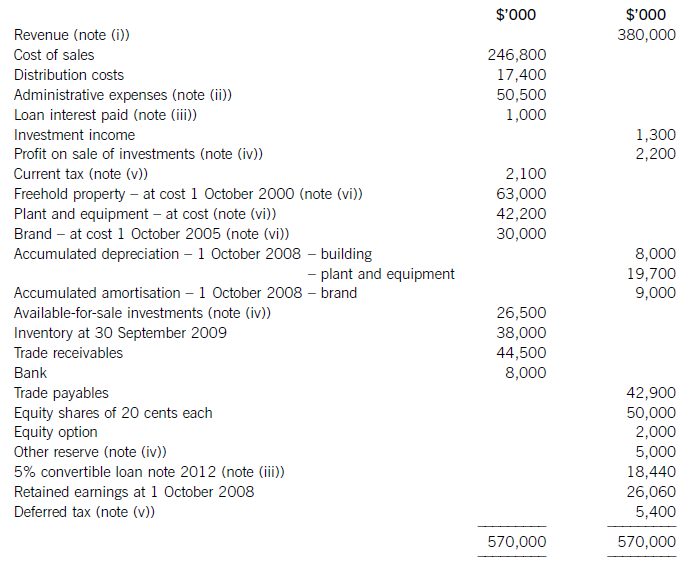Accumulated Depreciation ( )A. is used to show the amount of cost expiration of intangiblesB. is the same as Depreciation ExpenseC. is a contra asset accountD. is used to show the amount of cost expiration of nat
题目
A. is used to show the amount of cost expiration of intangibles
B. is the same as Depreciation Expense
C. is a contra asset account
D. is used to show the amount of cost expiration of nat
相似考题
更多“Accumulated Depreciation ( ) ”相关问题
-
第1题:
The following trial balance relates to Sandown at 30 September 2009:

The following notes are relevant:
(i) Sandown’s revenue includes $16 million for goods sold to Pending on 1 October 2008. The terms of the sale are that Sandown will incur ongoing service and support costs of $1·2 million per annum for three years after the sale. Sandown normally makes a gross profit of 40% on such servicing and support work. Ignore the time value of money.
(ii) Administrative expenses include an equity dividend of 4·8 cents per share paid during the year.
(iii) The 5% convertible loan note was issued for proceeds of $20 million on 1 October 2007. It has an effective interest rate of 8% due to the value of its conversion option.
(iv) During the year Sandown sold an available-for-sale investment for $11 million. At the date of sale it had a
carrying amount of $8·8 million and had originally cost $7 million. Sandown has recorded the disposal of the
investment. The remaining available-for-sale investments (the $26·5 million in the trial balance) have a fair value of $29 million at 30 September 2009. The other reserve in the trial balance represents the net increase in the value of the available-for-sale investments as at 1 October 2008. Ignore deferred tax on these transactions.
(v) The balance on current tax represents the under/over provision of the tax liability for the year ended 30 September 2008. The directors have estimated the provision for income tax for the year ended 30 September 2009 at $16·2 million. At 30 September 2009 the carrying amounts of Sandown’s net assets were $13 million in excess of their tax base. The income tax rate of Sandown is 30%.
(vi) Non-current assets:
The freehold property has a land element of $13 million. The building element is being depreciated on a
straight-line basis.
Plant and equipment is depreciated at 40% per annum using the reducing balance method.
Sandown’s brand in the trial balance relates to a product line that received bad publicity during the year which led to falling sales revenues. An impairment review was conducted on 1 April 2009 which concluded that, based on estimated future sales, the brand had a value in use of $12 million and a remaining life of only three years.
However, on the same date as the impairment review, Sandown received an offer to purchase the brand for
$15 million. Prior to the impairment review, it was being depreciated using the straight-line method over a
10-year life.
No depreciation/amortisation has yet been charged on any non-current asset for the year ended 30 September
2009. Depreciation, amortisation and impairment charges are all charged to cost of sales.
Required:
(a) Prepare the statement of comprehensive income for Sandown for the year ended 30 September 2009.
(13 marks)
(b) Prepare the statement of financial position of Sandown as at 30 September 2009. (12 marks)
Notes to the financial statements are not required.
A statement of changes in equity is not required.
正确答案:
(i)IAS18Revenuerequiresthatwheresalesrevenueincludesanamountforaftersalesservicingandsupportcoststhenaproportionoftherevenueshouldbedeferred.Theamountdeferredshouldcoverthecostandareasonableprofit(inthiscaseagrossprofitof40%)ontheservices.Astheservicingandsupportisforthreeyearsandthedateofthesalewas1October2008,revenuerelatingtotwoyears’servicingandsupportprovisionmustbedeferred:($1·2millionx2/0·6)=$4million.Thisisshownas$2millioninbothcurrentandnon-currentliabilities. -
第2题:
自2005年7月21日我国实行人民币汇率形成机制改革以来,美元对人民币的汇率有1:8.2765变为2013年7月26日1:6.1720,这表明人民对美元已经较大幅度地()。A:法定升值(Revaluation)
B:法定贬值(Devaluation)
C:升值(Appreciation)
D:贬值(Depreciation)答案:C解析:升值与贬值:市场汇率的变动。升值是指在外汇市场上,一定量的一国货币可以兑换到比以前更多的外汇,相应是外汇汇率下跌。贬值是指在外汇市场上,一定量的一国货币只能兑换到比以前更少的外汇,相应是外汇汇率上涨。 -
第3题:
自2005年7月21日我国实行人民币汇率形成机制改革以来,美元对人民币的汇率由1:8.2765变为2013年7月26日的1:6.1720,这表明人民币对美元已经较大幅度地()。A:法定升值(Revaluation)
B:法定贬值(Devalriation)
C:升值(Appreciation)
D:贬值(Depreciation)答案:C解析:升值是指在外汇市场上,一定量的一国货币可以兑换到比之前更多的外汇。美元兑人民币的汇率下降说明美元对人民币贬值,人民币对美元升值。 -
第4题:
()are?those?costs?that?cannot?be?directly?traced?to?a specific?project?and?therefore?will?be?accumulated?and allocated?equitably?over?multiple?projects?by?some?approved and?documented?accounting?procedure.A.Direct costs
B.Operation costs
C.Indirect costs
D.Implement costs答案:C解析:本题翻译:
()是指不能直接追溯到特定项目的成本,因此将通过一些批准和记录的会计程序在多个项目上平均累计和分配。
A.直接成本B.运营成本C.间接成本D.实施成本
本题考查成本的分类,不能直接的就可以理解为间接,间接成本:来自一般管理费用科目或几个项目共同负担的项目成本所分摊给本项目的费用。
而成本管理中不是涉及运营成本、实施成本。排除BD选项。所以此题选择C选项。
